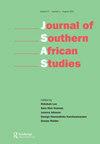没有宪政的宪法,没有治理的政府:马拉维的批判与希望
IF 0.7
4区 社会学
Q2 AREA STUDIES
引用次数: 0
摘要
《超越有罪不罚》冒着过于简单化这种对马拉维民主和治理状况的全面和多学科审查的风险,直接谈到了30多年前奥科特·奥根多所说的“没有宪政的宪法”的“非洲政治悖论”。这种悖论在于“对宪法理念的承诺和对宪政经典符号的拒绝”。考虑到独立时期,Okoth Ogendo指出,尽管非洲的政治精英真诚地致力于他们的国家有宪法的想法,但他们拒绝宪政的必要性。他们接受制定宪法的想法是基于承认内部治理的合法性以及向外部行为者维护各自非洲国家主权的必要性。对通过宪法的承诺并没有延伸到在实践中对宪法的尊重。《超越有罪不罚》将2019年和2020年总统和议会选举以及总统选举案作为审查马拉维民主和治理状况的跳板,表明马拉维仍然是一个在宪政记录可疑的进步宪法问题上挣扎的国家的突出例子。正如将要表明的那样,这本书提供了强有力的证据,表明该国有丰富的法律,但其对法治的遵守一直不一致;自1994年以来,马拉维定期举行选举,但选举产生的几个政府缺乏政治合法性。此外,尽管马拉维可以声称拥有过多的治理和问责机构,但没有出现一致的善政和问责制度文化;令人钦佩的本文章由计算机程序翻译,如有差异,请以英文原文为准。
Constitutions without Constitutionalism, Government without Governance: Critique and Hope for Malawi
At the risk of oversimplifying this rather comprehensive and multi-disciplinary examination of the state of democracy and governance in Malawi, Beyond Impunity speaks directly to what Okoth-Ogendo, more than three decades ago, dubbed the ‘African political paradox’ of having ‘constitutions without constitutionalism’. This paradox consists in a ‘commitment to the idea of the constitution and rejection of the classical notation of constitutionalism’. With the independence period in mind, Okoth-Ogendo observed that, while the political elite in Africa were sincerely committed to the idea of their states having a constitution, they rejected the need for constitutionalism. Their acceptance of the idea of having a constitution was based on the recognition of the need for legitimacy to govern internally and for asserting the sovereignty of their respective African states to external actors. The commitment to adopting constitutions did not extend to respect for the constitution in practice. Taking the 2019 and 2020 presidential and parliamentary elections and the presidential election case as a launch pad for examining the state of democracy and governance in Malawi, Beyond Impunity shows that Malawi remains a prominent example of a country struggling with the problem of having a progressive constitution with a questionable record of constitutionalism. As will be shown, the book provides strong evidence suggesting that the country has an abundance of laws but its adherence to the rule of law has been inconsistent; and that, since 1994, Malawi has had regular elections and yet several governments that resulted from those elections lacked political legitimacy. Furthermore, while Malawi can claim to have a plethora of institutions of governance and accountability, no consistent institutional culture of good governance and accountability has emerged; an admirable
求助全文
通过发布文献求助,成功后即可免费获取论文全文。
去求助
来源期刊

Journal of Southern African Studies
AREA STUDIES-
CiteScore
1.40
自引率
0.00%
发文量
73
期刊介绍:
The Journal of Southern African Studies is an international publication for work of high academic quality on issues of interest and concern in the region of Southern Africa. It aims at generating fresh scholarly enquiry and rigorous exposition in the many different disciplines of the social sciences and humanities, and periodically organises and supports conferences to this end, sometimes in the region. It seeks to encourage inter-disciplinary analysis, strong comparative perspectives and research that reflects new theoretical or methodological approaches. An active advisory board and an editor based in the region demonstrate our close ties with scholars there and our commitment to promoting research in the region.
 求助内容:
求助内容: 应助结果提醒方式:
应助结果提醒方式:


